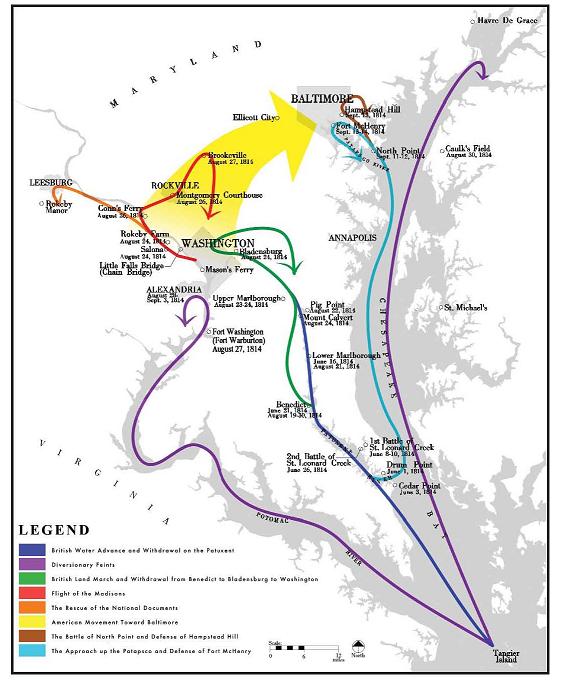It is
currently reported and believed in St. Mary's, Charles and Calvert counties,
and in the exposed parts of Prince George's, that Barney's flotilla into the
Patuxent for no other purpose than to bring the war into those federal
counties, and thus to divert the attention of the enemy from Baltimore and
Washington.[1]
The circumstances mentioned to support this statement are strong, if not
conclusive. In the first place the flotilla was equipped to defend Baltimore
harbor, and it was understood not to leave there. Secondly, Barney ran into the
Patuxent when it had been in his power to get into the Potomac, if he was
ordered their. Thirdly, instead of running into St. Leonard's Creek, if he had
proceeded up to Nottingham or pinpoint, a small place 7 miles higher up, he
might then have defended himself effectually, sloops of war being unable to
follow him. And, if necessary, he might have carried barges across on rollers
from pinpoint to the Chesapeake, only 9 miles. It would not have been the first
time that gunboats were seen in cornfields. But they could have been left in
safety. If Barney was ordered to the Patuxent for the purpose suppose it, it
was a most wicked and wanton act the executive. —[2]
Engaged in a War That
Was To End In A Stalemate, Did America's Founders Miscalculate Its Military
Institutions?" {accessed from the web June 28, 2014: http://www.earlyamerica.com/review/winter2000/federalist.html]
The
Federalists opposed the war for several specific reasons. For one thing, they
saw it as a party war designed to further the interests of Republicans and to
silence the opposition ~n a view that was reinforced by the Baltimore Riots in
1812 and the refusal of the administration to accept Federalists into the
Cabinet in1814. "I regard this war, as a war of party, and not of the
country," said Rufus King in 1812. "The people are no more obliged
"O to approve and applaud the measure," added the United States'
Gazette, "than "O any other party project."
The
Federalists also feared that the war would throw the nation into the arms of
Napoleon, who was variously described as "the great destroyer,"
"the little tyrant," the "monster of human depravity," and
"the arch-fiend who has long been the curse and scourge of the European
World." The initial protests against the war, particularly in New England,
often expressed greater fear of a French alliance than of the war itself.
"The horrors of war, compared with it, are mere amusement," said
Timothy Dwight. "The touch of France is pollution. Her embrace is
death." French Dominion, added William Ellery Channing, threatened not
just the wealth, but "the minds, character, morals, and the religion of
our entire nation."
Even
after the danger of a French alliance had receded, Federalists continued to
oppose the war because they considered it an "offensive" war aimed at
Canada. Although willing to support a war to protect American commerce or to
defend the nation's frontiers, they refused to sanction the conquest of Canada.
"Let it not be said," Congressman Morris Miller of New York told the
Republicans in 1813, "that we refuse you the means of defense. For that we
have always been ~n we still are ready to pen the treasure of the nation. We
will give you millions for defense; but not a cent for the conquest of Canada
~n not the ninety-ninth part of a cent for the extermination of its
inhabitants."
Transcribed by john Peter Thompson, 28th June
2014.




